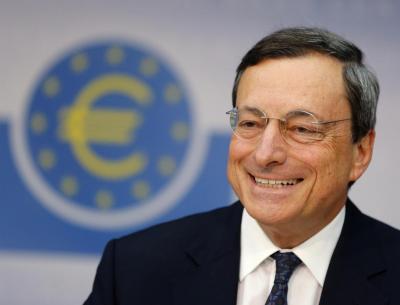September financial markets flood with new bond programme

ROME - Financial markets surged as the European Central Bank unveiled a government bond-buying programme to shore up finances of struggling Spain and Italy.
The scheme will provide a 'fully effective backstop to prevent potentially destructive scenarios', according to bank boss Mario Draghi. He added that it would address bond market distortions and the 'unfounded' fears of investors about the single currency.
The ECB supremo unveils eagerly awaited support for weaker eurozone members which have seen their borrowing costs rocket during the ongoing euro crisis The bond purchases, which Draghi dubbed 'outright monetary transactions', will be unlimited and the ECB will be treated equally with private creditors in case of default. Meanwhile, the ECB kept interest rates on hold at 0.75 per cent. Draghi's announcement has been eagerly anticipated by markets ever since he vowed earlier this summer to do 'whatever it takes' to save the euro.
But his bond-buying plans have been bitterly opposed by the Germans, who are against potentially inflationary handouts to spendthrift eurozone partners and are seeking cast iron commitments to economic reforms. Spain's benchmark 10-year interest rate dropped below 6 per cent following confirmation that ECB support was in the pipeline. Italy's rate also fell to 5.3 per cent. Despite market relief that imminent disaster and convertibility risk has been taken off the table by the ECB, it is important to remember that the European economy remains in dire straits, a fact reflected by the ECB downgrading its 2012 and 2013 growth forecasts, and eurozone GDP for Q2 confirmed at -0.2 per cent.
Far be it from me to knock the opposition, but in light of Barclays’ history of ‘financial irregularities’ particularly when it come to re-branding high risk investments as low-risk in order to sell to the elderly, I find myself compelled.
Italian investigators have seized documents from the Milan offices of Barclays as the bank was raided in connection with allegations it was involved in rigging Euribor borrowing rates.
Police took away "numerous documents, computer information and emails" from the bank’s office, according to a statement from the authorities, who are investigating whether
Barclays manipulated Euribor "just as it did with Libor".
The Italian police investigation follows complaints by consumer groups, which have claimed that more than 2m families in the country could have been affected by the rigging of Euribor amid estimates that the scandal could have cost about €1,200 (£934) per household.
Barclays declined to comment.
The investigation increases the pressure on Barclays after the Serious Fraud Office confirmed last month that it had found grounds to pursue criminal prosecutions against bankers involved in rate rigging. Last month Barclays became the first bank to settle with the authorities paying fines totalling £290m.
Italians are having to cut back on their cappuccinos and espressos and Spaniards are dropping their cortados, contributing to a sharp drop in wholesale coffee prices.
The coffee industry has long seen demand for the drink as inelastic and protected from economic fluctuations. But now coffee consumption per capita is down in Italy and Spain to levels last seen five to six years ago, largely because of the impact of the sovereign debt crisis.
The cost of the high-quality Arabica coffee in New York, the global benchmark, is down 43 per cent from a 34-year high set last year to $1.75 per pound. Arabica coffee prices last year surged to $3.089 per pound after Colombia, the largest producer of high quality beans had a poor harvest due to bad weather. In Italy, Europe’s second-biggest importer of coffee by volume, demand fell last year to 5.68 kilograms per person, the lowest in six years, according to the London-based International Coffee Organisation, the group that represents the major producing and consuming countries.
Mediterranean people are drinking more coffee at home, said Max Fabian, chief executive of Demus, an Italian decaffeinated coffee producer. "A lot of consumption was out-of-home, which was expensive, but people have switched," he said. The shift to brewing coffee at home has also prompted consumers to opt for cheaper blends, with a lower content of premium Arabica beans. In turn, demand for lower-quality Robusta beans, which have a bitter taste, have increased.
The realisation that coffee demand is not insulated from economic woes is to be one of the key topics at this week’s meeting of the International Coffee Organisation, the annual gathering of the industry in London.
Thank you to all the guests that supported our two events in Rome and Milan. Recently we held a glittering cocktail evening in Milan to usher in the new business semester and just before the summer break, we held a combined cocktail and farewell evening for Richard Vaughan who has re-located to the USA.
For personal and corporate financial advice, please contact our team at



